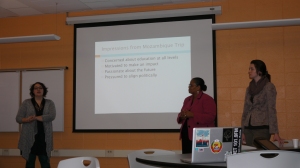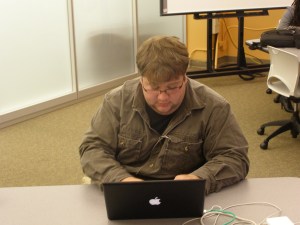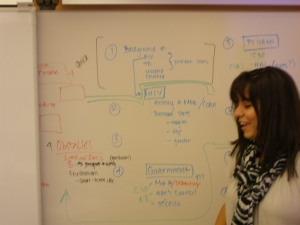There was exhaustion but extraordinary exhilaration among our students at the completion of the African Democracy Project/Mozambique in December 2009.  My own feelings were extraordinary satisfaction and pride for what my faculty colleagues and I had accomplished. We took a diverse class of 13 mostly undergraduate students to an African country that was at the early stages of development in its practice of democracy.
My own feelings were extraordinary satisfaction and pride for what my faculty colleagues and I had accomplished. We took a diverse class of 13 mostly undergraduate students to an African country that was at the early stages of development in its practice of democracy.
They had studied diligently for nearly two months, taking on the challenges of heavy readings, visiting lecturers, films and their own blogging. After some initial meetings I had arranged for them, they made appointments and arranged visits with prominent and ordinary citizens of Mozambique in preparation for observing the presidential elections for which they now were going to have unique perspectives that few, if any, other Americans had ever had or would again for at least the next 5 years.
They completed both one of three group projects and individual final projects for the course that displayed their deeply changed outlook from those that they displayed to the faculty and to each other at the first class meetings. In the Spring 2010, I conducted interviews with our students in order to get their perspective on the whole course and how they had been affected personally by the experience of democracy Mozambique. What I learned were several things, lessons that I will never forget.
First, while my students were highly indifferent to their own democracy, they were deeply committed to understanding democracy in Mozambique and wanted to understand it to a degree unequalled at first in their interest in their own democracy;
Second after the course, they were more circumspect about what democracy meant to them and more analytical of democracy here and in Mozambique;
Third, while every student was highly anticipative of the impending experience upon which they were about to embark, none anticipated the transformative experiences with which they were left at the end of the visit;
Fourth, more than half of the students had some notion of how they wanted to continue their contact with Africa, and while their plans varied widely, most anticipated returning to the continent in the future; and
Fifth and finally, we wanted the students to achieve a stronger connection between their experiences and strategies for impacting and improving democracy as well as solving other problems here at home.
This final point was particularly critical for those of us on the faculty and particularly in the Honors College, the home of our course and the home of many of the service learning projects of the university. Furthermore, FOCIS and the Eugene Applebaum Chair in Community Engagement, co-sponsors of the ADPM initiative, had as their commitments engaging the resources of the university to improved the greater Detroit community.
 Correcting this shortcoming was to become a major goal of the next course, African Democracy Project Botswana (ADPB).
Correcting this shortcoming was to become a major goal of the next course, African Democracy Project Botswana (ADPB).


